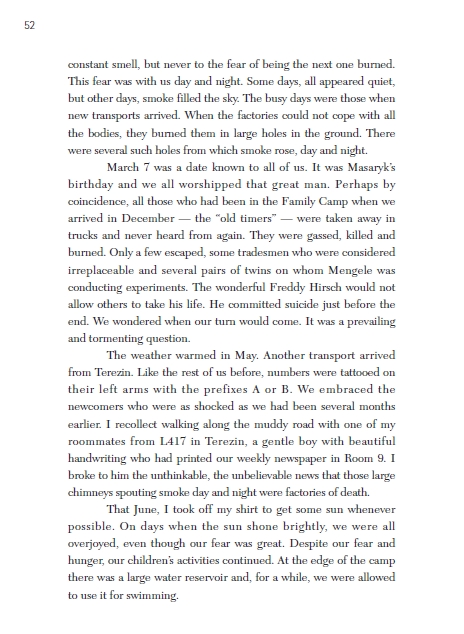 Auschwitz et Birkenau (p.52)
Auschwitz et Birkenau (p.52)
One grew used to the smoke and the constant smell, but never to the fear of being the next one burned.This fear was with us day and night. Some days, all appeared quiet, but other days, smoke filled the sky. The busy days were those when new transports arrived. When the factories could not cope with all the bodies, they burned them in large holes in the ground. There were several such holes from which smoke rose, day and night. March 7 was a date known to all of us. It was Masaryk’s birthday and we all worshipped that great man. Perhaps by coincidence, all those who had been in the Family Camp when we arrived in December — the “old timers” — were taken away in trucks and never heard from again. They were gassed, killed and burned. Only a few escaped, some tradesmen who were considered irreplaceable and several pairs of twins on whom Mengele was conducting experiments. The wonderful Freddy Hirsch would not allow others to take his life. He committed suicide just before the end. We wondered when our turn would come. It was a prevailing and tormenting question.The weather warmed in May. Another transport arrived from Terezin. Like the rest of us before, numbers were tattooed on their left arms with the prefixes A or B. We embraced the newcomers who were as shocked as we had been several months earlier. I recollect walking along the muddy road with one of my roommates from L417 in Terezin, a gentle boy with beautiful handwriting who had printed our weekly newspaper in Room 9. I broke to him the unthinkable, the unbelievable news that those large chimneys spouting smoke day and night were factories of death. That June, I took off my shirt to get some sun whenever possible. On days when the sun shone brightly, we were all overjoyed, even though our fear was great. Despite our fear and hunger, our children’s activities continued. At the edge of the camp there was a large water reservoir and, for a while, we were allowed to use it for swimming.